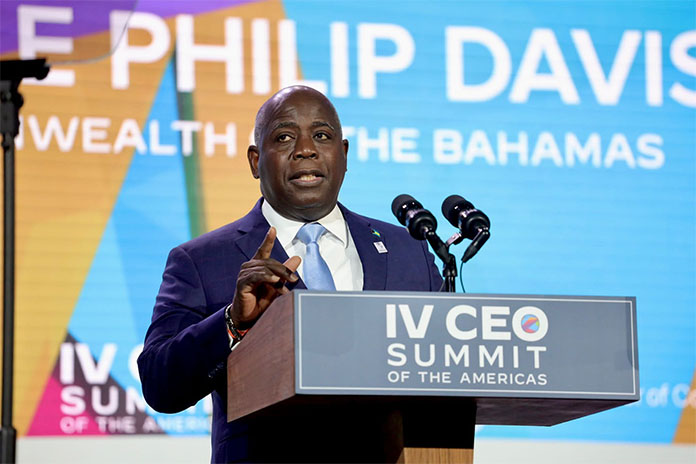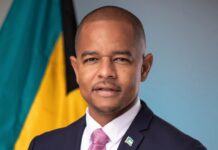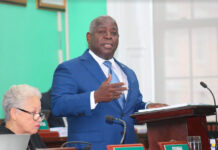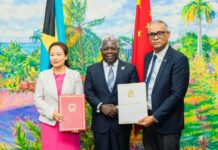PM Davis re-establishing our place on the world stage as he leads a delegation to the Summit of the Americas in Los Angeles California…

LOS ANGELES, California – While bringing remarks at the 9th Summit of The Americas CEO Summit, in Los Angeles, California, on June 8, 2022, Prime Minister and Minister of Finance the Hon. Philip Davis noted that he was there to represent The Bahamas “with an enormous sense of urgency”.
“The Bahamas has the distinction of consistently showing up in the top rankings of countries most vulnerable to climate change,” Prime Minister Davis said.
“When hurricanes come, as they do with increasing frequency and intensity, they make headlines in your countries for a few days,” he added. “But in our home, we’re left with the grief and devastation, with entire communities destroyed, and with the high debt burdens associated with recovery.
“And perhaps worst of all, with the understanding that the next Category 5 storm is likely to arrive sooner rather than later.”
Prime Minister Davis pointed out that what happens in high-emissions countries does not stay in those countries; and the risks The Bahamas face were “not theoretical, or abstract, or far-off, or occasional”.
“It’s true that no corner of the earth is immune to the risks of climate change,” he said. “Here in California, for example, wildfires and droughts represent major challenges.”
He added: “And in The Bahamas, our geography and our size mean that we live with the knowledge that one well-placed storm can wipe out our economy and, indeed, much of our country. Hurricane Dorian alone, in 2019, caused destruction worth one quarter of our GDP, and it wasn’t even focused on our capital city of Nassau.
“So we can’t afford more summits or conferences with only smiles and good intentions. We need to get to work.”
Prime Minister Davis said noted that, as small as The Bahamas is as a country, it believes that it has an important role to play in building solutions.
“In fact, in our small island-big ocean state, our seagrasses and mangroves play and will continue to play a critical role in acting as a carbon sink,” he said. “These ‘blue’ marine ecosystems can capture up to dozens of times the amount of carbon as tropical rainforests.”
“But we need resources to be able to conserve, protect and restore these blue carbon sinks, just as we need resources to make a transition to renewable energy, and just as we need resources to recover from previous storms and make our country more resilient in the face of future storms,” he added.
Carbon markets, Prime Minister Davis pointed out, were an important bridge to a net-zero future for all countries, and The Bahamas intends to be the first country in the world to develop and trade blue carbon credits.
“Many of the world’s top corporations are already participating in voluntary carbon markets,” he said. “In fact, one in five of the world’s 2,000 largest publicly listed companies have now committed themselves to a net-zero emissions target; and, as many multinational companies are directed by their shareholders to engage in stronger environmental practices, this number is likely to grow.”
Prime Minister Davis noted that there were estimates that the demand for carbon credits could be worth upwards of $50 billion in 2030.
“But this is just the potential – we need to work together to make it happen,” he said. “Today’s market is fragmented, and difficult to navigate. The public and the
private sector can come together to make the voluntary carbon market more transparent, more data-driven, better regulated, and more efficient.”
He pointed out that, in particular, once more buyers of carbon credits signal future demand, market incentives will facilitate more standardized verification and contracting.
“I grew up on a tiny island, Cat Island,” Prime Minister Davis related. “It might seem impossible to those of you who run countries and major corporations, but you have a lot at stake in protecting the Orange Creek and Alligator Creek mangroves of Cat Island. Even as we hope and pray that technology and human ingenuity will create new ways of sequestering carbon from the atmosphere, we must protect and defend the natural resources that already do so.”
“We’re all connected,” he added. “Climate change, the pandemic, and disruptions to supply chains, energy markets, and commodities – these problems originated outside of our borders, but Bahamian fishermen, straw vendors, and business owners pay a big price just the same. Just as pandemic restrictions began to ease, inflationary pressures have affected our recovery.
“Many of the world’s problems end up on our shores. But our shores may also provide some of the solutions for the world.”
Prime Minister Davis said that, by participating in and benefitting from the trade of carbon credits, The Bahamas will not be standing idly by, merely hoping that the rest of the world “does right by us”.
“We are not just advocates for change, we are agents for change,” he said.
“Likewise, we believe that when climate financing becomes more robust and more just, it will be a win not just for our country, but for yours as well,” he added.
Prime Minister Davis said that, with more than half his nation’s debt related to hurricanes, The Bahamas finds itself without resources to sufficiently adapt its infrastructure to the changing climate, or to transition as quickly as it would like to renewable energy.
The recovery time between severe weather events and external shocks was decreasing, while the financial gaps were increasing, he added.
“We find ourselves balancing the need to make progress on the sustainable development front with paying off debt and investing in our people,” Prime Minister Davis said.
“We are making progress,” he added. “We have committed to generating at least 30% of our energy from renewable sources by 2030, and we are willing to increase this ambition.”
Prime Minister Davis noted that The Bahamas was improving its coastal defenses through ecosystem-based adaptation practices.
“A ‘NoNet Loss’ policy is in effect for our coral reefs, mangroves and sea grasses, and forest management plans are being created to sustainably manage the forested areas across The Bahamas,” he said. “We are working with stakeholders to manage our environmental resources and to increase our capacity to manage development projects across our islands.”
“We are transitioning the government fleet to electric vehicles, and retrofitting government buildings with renewable energy components,” he added. “We are moving ahead with new solar energy projects, including grids for generation and storage capacity on islands where energy infrastructure was badly damaged by Hurricane Dorian.”
Prime Minister Davis said that he wanted to make the point that, while multilateral banks looked to provide loans in the aftermath of severe storms, climate financing needed to be more than disaster response and recovery. More consistent climate financing at lower rates would support the ability of all Caribbean nations to sustainably develop, he noted.
“The IPCC (Intergovernmental Panel on Climate Change) report released in April is clear: urgent and drastic action is needed if we are to limit global warming to 1.5°C,” he pointed out.
“There is an active 2022 hurricane season ahead of us and once again, we are forced to think about the unthinkable.”
“Astronauts have said The Bahamas is one of the most beautiful sights from space,” Prime Minister Davis added.
“Let’s work together to ensure the survival of my country and our earth.”







